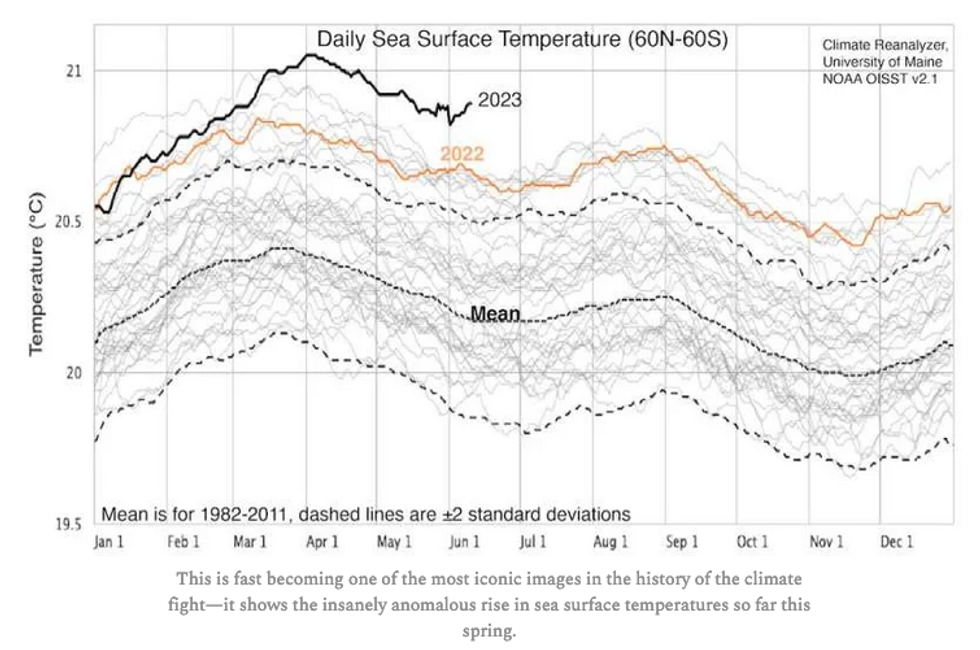We’ve reached the scariest moment yet in the climate saga: I noted in mid-April that there were all kinds of signs that a rapid increase in global warming was underway, and every day since has borne out that warning. We now have truly remarkable data about sea surface temperature—across the world’s oceans, and especially in the north Atlantic, we’re seeing numbers that aren’t just off the charts, they’re off the wall the chart is tacked to. It seems increasingly likely that 2023 will turn out to be the hottest year yet, even though a true El Niño won’t be fully underway till late summer or autumn.
All of this is terrifying—but far far worse is the fact that the world isn’t reacting rationally to it. The fossil fuel industry and its financial backers are, if anything, backsliding: tearing up their modest promises to make some kind of actual change. The rapid warming over the next couple of years is likely to be our last opportunity to really act coherently as a civilization to reduce the magnitude of this crisis, and so far we are blowing it.

For instance:
- Shell Oil this week made clear that it was not going to stick with its pledge to dramatically shrink its oil and gas production over this decade. It’s cut it some over the last few years—by the physically irrelevant accounting trick of selling its shale business to someone else—but now it plans to stabilize or increase production of hydrocarbons; it’s reducing its investments in renewables because they don’t generate as high a profit margin. The plan is an effort to “regain investor confidence,” and follows similar backsliding by BP earlier this year. One almost has some sympathy with the European oil giants; the markets have penalized them compared with their American counterparts Exxon and Chevron, who have made no bones about their plans to increase oil and gas production.
- In what’s quickly becoming the darkest of dark comedies, Big Oil is trying to completely take over the UN climate talks that it has merely manhandled in the past. Sultan al-Jaber, head of the Emirates oil company, is also head of the COP this November; as the New York Times points out, a wave of Twitter bots has been hailing his theoretically green credentials. Mr. al-Jaber insists he has a a “‘game changing’ plan to fight climate change by welcoming oil and gas companies from around the world to participate more fully in the talks. In other words, invite the producers of the fuels that cause the majority of global warming as key players in developing a plan to slow the warming.”
- The Net Zero Insurance Alliance is falling apart, as one company after another leaves behind a group which offered the most modest possible pledge of climate responsibility. More than half the companies in the group have now left (Canada’s sole entrant in the organization departed today); they’re citing pressure from American red state treasurers, who in their war against woke have threatened them with anti-trust action. In truth, the noise around ESG merely gives them a convenient excuse to do what they wanted anyway, which was ditch any meaningful climate commitment.
Taken together—and I could go on listing examples of this backlash for many paragraphs—these instances make clear that Big Oil, on the sugar high from the record profits that their pal Vladimir Putin produced for them in the last year, has no intention of shifting their business model. They are going to burn baby burn—they have stopped taking whatever meds they felt they had to swallow in the years between the Paris and Glasgow climate conference. At best, they mumble about ‘abatement,’ which in practice means things like the carbon dioxide injection wells proposed for Louisiana, and opposed by groups like Deep South Center for Environmental Justice. (Environmental justice organizations last week provided a powerful statement on the national wave of plans for carbon sequestration). All of this is absurd window-dressing, and it’s designed to keep the shareholders from having to deal with the fact that we now possess the ability to make clean energy from the sun and wind, and to do it more cheaply than burning hydrocarbons.
I think the chaos that this rapid rise in temperature is sure to unleash may be the last slap across the face we get while there’s still time to really make a difference in how hot the planet gets.
UN Secretary General Antonio Guterres—alongside Greta Thunberg the loudest climate voice on the planet—gave a truly signal speech today, in which he got to the heart of the matter:
“Fossil fuel industry transition plans must be transformation plans, that chart a company’s move to clean energy – and away from a product incompatible withhuman survival. Otherwise, they are just proposals to become more efficient planet-wreckers.”
Guterres is paying close attention to the political debates in the U.S. (Imagine if we had, say, a president willing to speak this clearly):
Fossil fuel companies must also cease and desist influence peddling and legal threats designed to knee-cap progress. I am thinking particularly of recent attempts to subvert net zero alliances, invoking anti-trust legislation.
And he called for an “Acceleration Agenda.”
We will get a chance to support that agenda in September, during so-called “Climate Week” in New York. A coalition of groups is tonight announcing plans for a massive march in Manhattan that week—it’s not too late to join in on the launch call. There’s real history here: the world’s first huge climate march was in 2014 in New York, when 400,000 people turned out, including the Secretary General of the UN. That helped pave the way for the Paris climate accords: as President Obama said shortly afterwards, “Our citizens keep marching. We cannot pretend we do not hear them. We have to answer the call.”
As I said earlier, I think the chaos that this rapid rise in temperature is sure to unleash may be the last slap across the face we get while there’s still time to really make a difference in how hot the planet gets. See you in New York in September.

